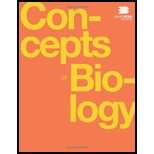
Concept explainers
What is the difference between micro- and macroevolution?
a. Microevolution describes the evolution of small organisms, such as insects, while
macroevolution describes the evolution of large organisms, like people and elephants.
b. Microevolution describes the evolution of microscopic entities, such as molecules and proteins, while macroevolution describes the evolution of whole organisms.
c. Microevolution describes the evolution of populations, while macroevolution describes the emergence of new species over long periods of time.
d. Microevolution describes the evolution of organisms over their lifetimes, while
macroevolution describes the evolution of organisms over multiple generations.
Trending nowThis is a popular solution!

Chapter 11 Solutions
Concepts of Biology
Additional Science Textbook Solutions
College Physics
Human Physiology: An Integrated Approach (7th Edition)
Microbiology: An Introduction (13th Edition)
Human Biology: Concepts and Current Issues (8th Edition)
Human Anatomy & Physiology
Campbell Essential Biology (6th Edition) - standalone book
- Through _______, a body part of an ancestor is modified differently in different lines of descent. a. homologous evolution c. adaptive divergence b. morphological convergence d. morphological divergencearrow_forwardWhat does the term evolution mean? A. The characteristics of species become more complex over time. B. The strongest individuals produce the most offspring. C. The characteristics of an individual change through the course of its life, in response to natural selection. D. The characteristics of populations change through time.arrow_forwardThe definition of "lineage" is: Select one or more: a. the same as the Tree of Life b. a population of organisms captured at one specific time c. a series of ancestor and descendant lineages over time d. a character that has evolved over timearrow_forward
- 1)Provide a scientific example of evolution and/or natural selection. You can use human and/or animal examples.2) Describe how the animal/species developed an advantage over time or what the evolutionary process was.3) Give a source for where you located your information.arrow_forwardThe three beetle species live in the same ecosystem, and they likely evolved from the ancestral species that colonized the region. Which statement best explains how descent with modification influenced speciation in these beetles? A. The ancestral species carried neutral gene mutations that spontaneously caused speciation when they colonized the region. B. The ancestral species randomly diverged into three species before colonization and then colonized the regions that best suited their new adaptations. C. After colonization, small groups separated from the rest of the ancestral species and developed different adaptations that helped them survive and reproduce. D. After colonization, the large group interbred until they developed enough neutral genetic mutations for speciation to occur.arrow_forwardWhat is the correct sequence for the organic evolution as proposed by Darwin and Wallace? A. Overproduction, constancy of population size, variations, natural selection. B. Variations, natural selection, overproduction, constancy of population size.. C. Overproduction, variations, constancy of population size, natural selection. D. Variations, constancy of population size, overproduction, natural selection.arrow_forward
- a). define fitness in terms of an evolutionary term what does fitness mean? b). by what process would analogous structures evolve so they look alike? c). by what process would 2 related but geographically separated groups evolve similar adaptations independently.arrow_forwarda. What did Darwin's travels reveal to him about the number and variety of living species? b. How did tortoises and birds differ among the islands of the Galapagos? c. What is evolution? Why is referred to as a theory? d. Darwin found fossils of many organisms that were different from any living species. How would this finding has affecting his understanding of lifes diversity?arrow_forwardImagine that some lizards from both islands are brought to a laboratory and lizards from each population are separately bred for a generation. The offspring resemble their parents (i.e. they look like lizards from their home island). Does this support or contradict the idea that evolution has occurred? Group of answer choices a. support because it implies that a genetic change has occurred b. contradict because the lizards were removed from the islands c. support because the phenotype matches the environment d. contradict because the environment is different in the lab e. support because it is a major change in phenotypearrow_forward
- Species can vary in several ways. Which of the following is one of Darwin’s ideas that was accepted by most scientists of his time due to the large number of fossils being discovered at that time? A. Species that live in seawater can also live on mountains. B. Species have specific adaptations to their local environment. C. Species vary around the world. D. Species change over long periods of time.arrow_forwardHow does the founder effect show that Africa is where our species originated? (Hint: Think about genetic diversity.) A. Today, people living in Africa have more genetic diversity than all other people in all other areas of the world. B. Today, people living in Africa have less genetic diversity than all other people in all other areas of the world. C. Today, people living in Africa have the same genetic diversity as all other people in all other areas of the world. D. Today, people living in North America have more genetic diversity than all other people in all other areas of the world.arrow_forwardIn essay form, explain the benefits, effects, and contributions of the five agents of evolutionary change.arrow_forward
 Concepts of BiologyBiologyISBN:9781938168116Author:Samantha Fowler, Rebecca Roush, James WisePublisher:OpenStax College
Concepts of BiologyBiologyISBN:9781938168116Author:Samantha Fowler, Rebecca Roush, James WisePublisher:OpenStax College

